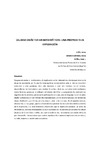Please use this identifier to cite or link to this item:
https://accedacris.ulpgc.es/jspui/handle/10553/74641
| DC Field | Value | Language |
|---|---|---|
| dc.contributor.author | León González-Vélez, Jaime José | en_US |
| dc.contributor.author | Medina-Garrido, Elena | en_US |
| dc.contributor.author | Núñez Alonso, Juan Luis | en_US |
| dc.date.accessioned | 2020-10-02T11:36:09Z | - |
| dc.date.available | 2020-10-02T11:36:09Z | - |
| dc.date.issued | 2017 | en_US |
| dc.identifier.isbn | 978-84-697-4106-1 | en_US |
| dc.identifier.uri | https://accedacris.ulpgc.es/handle/10553/74641 | - |
| dc.description.abstract | Desgraciadamente el rendimiento y la implicación en las Matemáticas disminuyen durante la etapa de secundaria, por lo que los investigadores se encuentran ante el reto de encontrar soluciones a este problema. Para ello, llevamos a cabo dos estudios. En el primero, desarrollamos un instrumento para evaluar la calidad didáctica, concretamente evaluamos nueve factores: promover la utilidad y el interés, identificar y comprender los sentimientos negativos de los alumnos, promover la participación en clase, usar un lenguaje no controlador, diseñar actividades con un nivel de dificultad adecuado, centrarse en el proceso, estructurar las clases, feedback y, por último, ser afectuoso y cuidar a los alumnos. En el segundo estudio, observamos, a nivel grupal, que la calidad didáctica predecía las notas de Matemáticas a través de la implicación, y a nivel individual, observamos que la implicación predecía las notas de Matemáticas. Con esta investigación, no solo aportamos un instrumento para evaluar la calidad didáctica de forma fiable y válida, sino que también es una herramienta que puede utilizarse para desarrollar intervenciones que pueden impulsar a los alumnos a implicarse más en clase y, con ello, mejorar su rendimiento académico. | en_US |
| dc.description.abstract | Math achievement and engagement declines in secondary education; therefore, educators are faced with the challenge of engaging students to avoid school failure. Within self-determination theory, we address the need to assess comprehensively student perceptions of teaching quality that predict engagement and achievement. In study one we developed a questionnaire to assess nine factors: teaching for relevance, acknowledge negative feelings, participation encouragement, controlling language, optimal challenge, focus on the process, class structure, positive feedback, and caring. In the second study, at the classroom level, teaching quality was a predictor of behavioral engagement. Higher grades were observed in classes where students, as a whole, displayed more behavioral engagement. At the within level, behavioral engagement was associated with achievement. We not only provide a reliable and valid method to assess teaching quality, but also interventions could be designed based on the scale items to encourage students to persist and display more engagement on school duties, which in turn bolsters student achievement. | en_US |
| dc.language | spa | en_US |
| dc.publisher | Asociacion Interuniversitaria de Investigacion Pedagógica (AIDIPE) | en_US |
| dc.source | XVIII Congreso Internacional de Investigación Educativa: Interdisciplinaridad y Transferencia (AIDIPE2017) , p. 1947-1955 | en_US |
| dc.subject | 5801 Teoría y métodos educativos | en_US |
| dc.subject.other | Calidad didáctica | en_US |
| dc.subject.other | Matemáticas | en_US |
| dc.subject.other | Educación Secundaria | en_US |
| dc.subject.other | Rendimiento académico | en_US |
| dc.subject.other | Academic Achievement | en_US |
| dc.subject.other | Teacher Quality | en_US |
| dc.subject.other | Teacher Evaluation | en_US |
| dc.subject.other | Mathematics Achievement | en_US |
| dc.title | Calidad didáctica en Matemáticas: una propuesta de evaluación | en_US |
| dc.type | info:eu-repo/semantics/conferenceObject | en_US |
| dc.type | Conference proceedings | en_US |
| dc.relation.conference | XVIII Congreso Internacional de Investigación Educativa (AIDIPE 2017) | en_US |
| dc.description.lastpage | 1955 | en_US |
| dc.description.firstpage | 1947 | en_US |
| dc.investigacion | Artes y Humanidades | en_US |
| dc.type2 | Actas de congresos | en_US |
| dc.description.numberofpages | 9 | en_US |
| dc.utils.revision | Sí | en_US |
| dc.identifier.ulpgc | Sí | es |
| dc.contributor.buulpgc | BU-EGB | en_US |
| item.grantfulltext | open | - |
| item.fulltext | Con texto completo | - |
| crisitem.event.eventsstartdate | 28-06-2017 | - |
| crisitem.event.eventsenddate | 30-06-2017 | - |
| crisitem.author.dept | GIR IATEXT: Didáctica, Aprendizaje y Motivación en Contextos Específicos | - |
| crisitem.author.dept | IU de Análisis y Aplicaciones Textuales | - |
| crisitem.author.dept | Departamento de Educación | - |
| crisitem.author.dept | GIR IATEXT: Didáctica, Aprendizaje y Motivación en Contextos Específicos | - |
| crisitem.author.dept | IU de Análisis y Aplicaciones Textuales | - |
| crisitem.author.dept | Departamento de Psicología, Sociología y Trabajo Social | - |
| crisitem.author.orcid | 0000-0002-9587-4047 | - |
| crisitem.author.orcid | 0000-0002-2400-7843 | - |
| crisitem.author.parentorg | IU de Análisis y Aplicaciones Textuales | - |
| crisitem.author.parentorg | IU de Análisis y Aplicaciones Textuales | - |
| crisitem.author.fullName | León González-Vélez, Jaime José | - |
| crisitem.author.fullName | Núñez Alonso, Juan Luis | - |
| Appears in Collections: | Actas de congresos | |
Page view(s)
70
checked on Jan 10, 2026
Download(s)
27
checked on Jan 10, 2026
Google ScholarTM
Check
Altmetric
Share
Export metadata
Items in accedaCRIS are protected by copyright, with all rights reserved, unless otherwise indicated.
